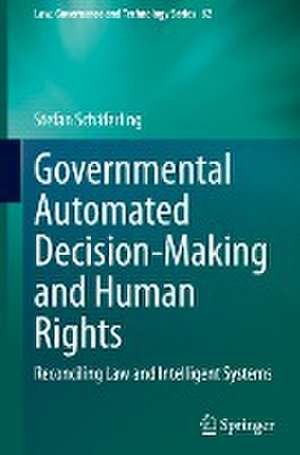Governmental Automated Decision-Making and Human Rights: Reconciling Law and Intelligent Systems: Law, Governance and Technology Series, cartea 62
Autor Stefan Schäferlingen Limba Engleză Hardback – 8 dec 2023
Din seria Law, Governance and Technology Series
- 18%
 Preț: 950.33 lei
Preț: 950.33 lei - 24%
 Preț: 645.10 lei
Preț: 645.10 lei - 20%
 Preț: 691.09 lei
Preț: 691.09 lei - 20%
 Preț: 574.07 lei
Preț: 574.07 lei - 20%
 Preț: 879.80 lei
Preț: 879.80 lei - 20%
 Preț: 878.75 lei
Preț: 878.75 lei - 15%
 Preț: 720.23 lei
Preț: 720.23 lei - 18%
 Preț: 1122.56 lei
Preț: 1122.56 lei - 18%
 Preț: 1130.27 lei
Preț: 1130.27 lei - 15%
 Preț: 642.83 lei
Preț: 642.83 lei - 18%
 Preț: 950.52 lei
Preț: 950.52 lei - 18%
 Preț: 1009.85 lei
Preț: 1009.85 lei - 18%
 Preț: 1115.14 lei
Preț: 1115.14 lei - 15%
 Preț: 653.14 lei
Preț: 653.14 lei - 18%
 Preț: 949.23 lei
Preț: 949.23 lei - 18%
 Preț: 1014.76 lei
Preț: 1014.76 lei - 15%
 Preț: 638.43 lei
Preț: 638.43 lei - 18%
 Preț: 1124.30 lei
Preț: 1124.30 lei - 18%
 Preț: 1124.60 lei
Preț: 1124.60 lei - 18%
 Preț: 999.45 lei
Preț: 999.45 lei - 18%
 Preț: 892.42 lei
Preț: 892.42 lei - 15%
 Preț: 640.37 lei
Preț: 640.37 lei - 18%
 Preț: 947.35 lei
Preț: 947.35 lei - 20%
 Preț: 340.32 lei
Preț: 340.32 lei - 18%
 Preț: 1692.20 lei
Preț: 1692.20 lei - 18%
 Preț: 954.93 lei
Preț: 954.93 lei - 24%
 Preț: 789.36 lei
Preț: 789.36 lei -
 Preț: 397.59 lei
Preț: 397.59 lei - 20%
 Preț: 876.57 lei
Preț: 876.57 lei - 20%
 Preț: 652.41 lei
Preț: 652.41 lei - 18%
 Preț: 900.49 lei
Preț: 900.49 lei - 18%
 Preț: 941.50 lei
Preț: 941.50 lei -
 Preț: 392.97 lei
Preț: 392.97 lei
Preț: 1006.37 lei
Preț vechi: 1227.28 lei
-18% Nou
Puncte Express: 1510
Preț estimativ în valută:
192.59€ • 200.81$ • 160.06£
192.59€ • 200.81$ • 160.06£
Carte tipărită la comandă
Livrare economică 21 martie-04 aprilie
Preluare comenzi: 021 569.72.76
Specificații
ISBN-13: 9783031481246
ISBN-10: 3031481240
Pagini: 305
Ilustrații: XV, 305 p.
Dimensiuni: 155 x 235 mm
Greutate: 0.63 kg
Ediția:1st ed. 2023
Editura: Springer Nature Switzerland
Colecția Springer
Seria Law, Governance and Technology Series
Locul publicării:Cham, Switzerland
ISBN-10: 3031481240
Pagini: 305
Ilustrații: XV, 305 p.
Dimensiuni: 155 x 235 mm
Greutate: 0.63 kg
Ediția:1st ed. 2023
Editura: Springer Nature Switzerland
Colecția Springer
Seria Law, Governance and Technology Series
Locul publicării:Cham, Switzerland
Cuprins
Part I: Approaching Governmental Automated Decision-Making And Human Rights.- 1 Introduction.- 2 Artificial intelligence and automated decision-making – terminological clarifications.- 3 Automated decision-making and the law.- Part II: Protecting Human Rights In An Automated World – Is The Law Prepared For The Challenges Of Governmental Automated Decision-Making?.- 4 Identifying challenges of governmental automated decision-making.- 5 Confronting the legal challenges of governmental automated decision-making.- 6 The underlying challenge to human agency.- Part III: Towards A Human Right Against Automated Decision-Making?.- 7 The case for a right against automated decision-making.- 8 Reconciling human rights and intelligent systems – contents and implications of a right against governmental automated decision-making.- 9 Conclusion and Outlook.
Notă biografică
Stefan Schäferling studied law at LMU Munich, The University of Edinburgh, and as a Hauser Global Scholar at NYU School of Law. He holds a doctoral degree from LMU Munich, where worked as a Research Assistant and taught public international law and EU law as well as an LL.M. in International Legal Studies from NYU School of Law. He is currently working as an Assistant Legal Counsel at the Permanent Court of Arbitration in The Hague.
Textul de pe ultima copertă
With the growing capabilities of artificial intelligence, governments are integrating AI technologies into administrative and even judicial decision-making, aiding and in some cases even replacing human decision-makers. Predictive policing, automated benefits administration, and automated risk assessment in criminal sentencing are but a few prominent examples of a general trend. While the turn towards governmental automated decision-making promises to reduce the impact of human biases and produce efficiency gains, reducing the human element in governmental decision-making also entails significant risks. This book analyses these risks through a comparative constitutional law and human rights lens, examining US law, German law, and international human rights law. It also highlights the structural challenges that automation poses for legal systems built on the assumption of exclusively human decision-making. Special attention is paid to the question whether existing law can adequately address the lack of transparency in governmental automated decision-making, its discriminatory processes and outcomes, as well as its fundamental challenge to human agency. Building on that analysis, it proposes a path towards securing the values of human dignity and agency at the heart of democratic societies and the rule of law in an increasingly automated world. This book will be of interest to researchers and scholars focusing on the evolving relationship of law and technology as well as human rights scholars. Further, it represents a valuable contribution to the debate on the regulation of artificial intelligence and the role human rights can play in that process.
Caracteristici
Demonstrates the need for a new human right protecting the core values of human agency and dignity Identifies the core human rights challenges posed by governmental use of automated decision-making technology Provides the first comparative analysis of US, German, and human rights law’s readiness to tackle these challenges
